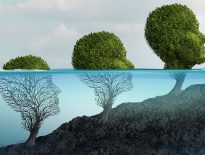The end of the last century created the perfect context for postmodernism to exercise its veto over all the ethical dilemmas of the day. As a result, today, as in vitro fertilisation, abortion, euthanasia or homosexual marriage enter the legislative agendas of more and more countries, we see political correctness taking precedence over religious morality.
The relegation of religious morality to the same dustbin of history where the memories of error, discrimination, and institutional abuse are kept has made a mockery of the oldest universal ethical standard. What has been left in its place is a paradox, for while postmodernism has suspended recourse to religion on the basis of universal fairness, it has shaped that fairness according to predominantly humanistic criteria, closing the relativist eye to this discriminatory favour.
The Dalai Lama justified this new ethic by saying that “in today’s secular world religion alone is no longer adequate as a basis for ethics… Any religion-based answer to the problem of our neglect of inner values can never be universal, and so will be inadequate. What we need today is an approach to ethics which makes no recourse to religion and can be equally acceptable to those with faith and those without: a secular ethics.”[1] Many followers of religion would characterise the Dalai Lama’s proposed solution as nonsense, believing that “for many people, ethics is not only tied up with religion, but is completely settled by it.”[2] In the context of secular ethics,[3] despite different approaches, it is generally assumed that humans are rational and responsible beings, capable of empathy and compassion, and that somehow ethical norms should be born out of these qualities.
Six foundations of secular morality
Jonathan David Haidt is a social psychologist and professor of Ethical Leadership at New York University Stern School of Business. In his books, articles and speeches, he proposes a morality based on natural principles, formulated on the basis of a careful study of (human) nature.
As part of a broader initiative launched in 2004, the groundwork was laid for what is called the “moral foundations theory.”[4] The theory proposes at least six foundations, pillars of an “innate morality,”[5] on the basis of which each culture would be free to develop a complex ethical system according to its own particularities.
The first pillar is care for others. Proponents of secular ethics believe that humans, like other mammals, are hardwired to bond with and care for their fellow humans and to feel compassion, especially for the weak and vulnerable. This leads us to have strong feelings of rejection towards those who harm others.
The second foundation is the correlation between fairness and reciprocity. There is ambiguous evidence for reciprocity in other animals, but in humans the evidence is as clear as it can be. Of course, the rule of reciprocity (often called the “golden rule”) also underlies the ethics of many religions.
The third foundation is based on the relationship between freedom and oppression. Individuals instinctively seek autonomy within a group.
The fourth is loyalty to the group. In the animal world there are groups that cooperate in more or less complex ways (dolphins, wolves, and lions, for example), but this cooperation is limited to small groups and largely between related individuals. Although cooperation and association in humans is at a different level, it is thought to be based on the same mechanisms as in animals.
The fifth foundation is the relationship between respect and authority, which refers to the natural hierarchical structure also found in the animal kingdom, although it is not based on brutality but rather on power.
The sixth is the purity-sanctity relationship. Purity refers to any kind of ideology, any kind of concept that tells you that you can achieve virtue by controlling what you do with your body (whether it’s food or sexuality). According to many scholars, the concept of sanctity is a cultural refinement and extension of purity.
Why biology cannot regulate morality
At this point it is important to note that a secular ethic is not necessarily anti-religious. As we can see, some secular values are similar or even identical to some of the teachings of various religious systems. The difference lies not so much in the principles advocated, but in the secular premises, which cling to a supposed instinctive origin, specific to the animal world.
This origin—invoked for the first four pillars listed above—is not at all plausible from the perspective of ethology, the science that studies the innate aspects of animal behaviour. We can look for as many similarities as we like between human and animal behaviour, but we will always have to admit, together with ethology, that the great difference between the two is reason and consciousness, which are uniquely human.[6]
Thus, the ennoblement of animal instincts by giving them intrinsic values such as care for others, compassion or loyalty seems to be a kind of social Darwinism in reverse; that is, it puts a plus sign in front of a negative theory of society, which would justify the struggle for existence in itself, similar to natural selection in the animal world. How did animal instincts suddenly become something good and noble? In fact, we may well ask ourselves which animals we are talking about, because they too are so diverse that generalisations no longer tell us anything. It is one thing to have in mind a flock of sheep or the work of a hive of bees, quite another to have in mind a pack of hyenas or some sharks that devour their siblings in the mother’s womb before they are even born. What is the basis of our analogies with more favourable species?
| “The modern man is in general, even with the best will, unable to give religious ideas a significance for culture and national character which they deserve” (Max Weber, The Protestant Ethic and the Spirit of Capitalism, New York, Scribner, 1930, p. 183). |
The pedestal of the monument of reason always remains empty…
Proponents of secular ethics believe that individuals are morally responsible agents and that people should do good deeds for the sake of doing good deeds. Secular ethics is characterised by “activities that are healthy, socially useful and in accordance with reason.”[7] Practice, however, has repeatedly shown that people are unable or unwilling to conform to this vision, but rather follow the path captured by the famous Latin proverb, Homo homini lupus est (Man is a wolf to man).
Moreover, there is a discrepancy between postulating the origin of the moral pillars in instincts and, where the analogy with animals is shaky, revealing the rational nature of humans. A question arises concerning the innate or intuitive character of this secular morality; either it is instinctive, and then it may be innate (but it cannot be too noble), or it is rational, and then it presupposes a process of socialisation by which a person acquires a moral education and consciously assimilates these values. However, it cannot be argued that humans, as rational beings, are already born with these moral foundations or that they manifest them on their own. This would make the socialisation of the individual superfluous; it would mean that people are moral beings even before they are social beings.
We can discern here the old Enlightenment confidence in human reason, an exaggerated confidence that social practice has disproved. Psychoanalysis and then psychology also disproved it when they admitted that the human mind is not one hundred percent rational, but also contains the unconscious.
Yet this betrays a new contradiction in the premises of the new secular ethic: between the postmodern, relativistic cultural context and a reminiscence of modernity. One of the “grand narratives of legitimation”[8] abandoned in postmodern culture is precisely that of reason as the unchanging nature of mankind; moreover, the very discourse of human nature is avoided, as is the discourse of a single truth or a single reality.

Foundations on shifting sands
Protagoras of Abdera (487-420 B.C.) left us with the saying, “Man is the measure of all things.” Should the same logic apply to ethical rules? The proponents of secular ethics say an unequivocal “yes”.
The relativism from which postmodernism sprang is a principle according to which each culture is unique and can therefore be judged only by its own standards and values, not by those of another culture or one that is taken as a standard.[9] By extrapolation, any ethical code is particularised and without absolute rules; there can no longer be a generally acceptable standard code. On this basis, the moral code of the Christian religion, which aspires to universalisation, is rejected.
However, ethical relativism is rejected by most specialists because it leads to a dangerous dissolution of all standards and values. It is agreed that centrist positions should be avoided, because they are full of prejudices and discrimination against other competing positions, but, as some ask, is the price of this the view that “anything goes”?[10] On the other hand, what the new secular ethic proposes is also discriminatory, because it rejects from the outset as partners in dialogue those who embrace an ethic with a religious foundation, even if some points are common. And if it simply ignores them by proposing instead a single narrative of moral legitimation, then this resembles globalisation rather than postmodern relaxation, which sends shivers down the spine of any defender of freedom of conscience.
It violates precisely that sound principle of critical thought which says: “The whole strength and value, then, of human judgment, depending on the one property, that it can be set right when it is wrong, reliance can be placed on it only when the means of setting it right are kept constantly at hand”.[11] In our case, it is a question of openness to criticism, through arguments and facts.
If the new humanist morality avoids the possibility of being shown to be wrong from another point of view, it falls into the same exclusivism of which it finds other moralities guilty. And if it regards dialogue with other moralities as impossible, it reveals its own limitations and relativism and provokes rejection. This is because in today’s culture there are fruitful dialogues between different moral perspectives, even between atheistic and religious ones. Take that between two Italian men of culture, Cardinal Carlo Maria Martini and the atheist writer and academic Umberto Eco. Both expressed, albeit in different ways, the same idea—that a natural ethics can coincide with the ethics supported by biblical revelation, in so far as the former includes a path or a relationship to transcendence, not just to the image of the other.[12]
“If there is no God, everything is permissible”
By definition, an ethical system should not be constructed to legitimise or justify the present state of affairs, but to envision a desirable model for a state of affairs that is improved as much as possible. In this sense, secular ethics appears to determine circumstances first and only then define its objectives. Perhaps this is where religious ethics has a great advantage.
In the 1960s, the Jewish professor and rabbi Abraham Joshua Heschel gave a lecture at the University of California on the relationship between religion and morality. During the discussion, a professor in the audience challenged him by questioning the necessity of religion. The professor argued that he was a good person who lived an honest and moral life, and he wondered what religion could offer him. Heschel replied that this was the difference between them. The professor saw himself as a good man, whereas Heschel did not. Religion, he explained, made him more aware of his own moral imperfections and, by raising his gaze to God, inspired him to progress, to strive for something higher.[13]
The golden rule of secular morality is weaker than the rule of Christian morality; the former is negative and retrusive: “Don’t do unto others what you don’t want done unto you,”[14] while the latter sounds much more generous and altruistic: “Do to others whatever you would like them to do to you.” The origin of this Christian rule lies in charity, and it is indeed an ideal; it shows the best model of coexistence. Now, while the secular golden rule might be an ideal for communities that have not yet discovered it or do not yet observe it, it cannot be an ideal for communities in which Christian morality has achieved even more. It is as if we were offered a cultural McDonald’s, the same everywhere, with the same ingredients, equalising and “democratic”, for which we would abandon traditional restaurants and gastronomy, which are richer.
If we accept that God created us “in His image and likeness”, this likeness implies that He has given us something of His character; the Bible tells us that no one can see His face “and live”; but whoever comes to see His character has every chance of living.
“A good deed, done because it is good, carries within it an affirmation of transcendence. ‘If there is no God, everything is permitted,’ said Dostoyevsky. Empty words? And yet, Sartre admits, from an atheist’s point of view: ‘There disappears with Him all possibility of finding values in an intelligible heaven. There can no longer be any good a priori, since there is no infinite and perfect consciousness to think it. It is nowhere written that the good exists, that one must be honest or must not lie’, (Existentialism is a Humanism). If properly followed, this path of reflection will show that morality does not only regulate interpersonal relations, but also has a transcendent dimension.”[15]



















